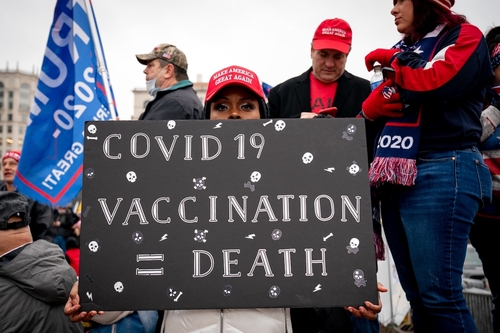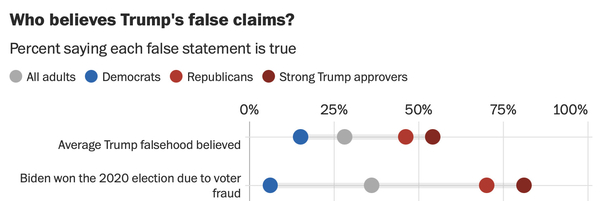Matthew Continetti writes in his newly published book, The Right: The Hundred Year War for American Conservatism, that conservative rhetoric of late "has often veered into apocalypticism and conspiracy theory."
Indeed, it has. Specifically, three conspiracy theories have damaged the American conservative movement during the past year and a half, diverting Republican Party attention, derailing it from enduring principles, and diminishing its electoral appeal among young voters. To get back on track, Republicans must stop alleging that the 2020 presidential election was a "fraud," that COVID-19 vaccinations are "dangerous," and that the U.S. government "lied" about developing banned bio-weapons in Ukraine.
Donald Trump sowed the seeds of the election conspiracy way back in 2016, with statements like, "I will totally accept the results of this great and historic presidential election— if I win," and that he would reject the election results should he lose to Hillary Clinton. He reiterated this threat during the 2020 campaign and, as the election returns soured for him, actualized it by rejecting Fox News' projection that Joe Biden would win Arizona, a state Trump expected to carry.
After polls closed, the "stolen election" conspiracy theory emerged full blown, as Trump claimed theft in five other states: Georgia, Michigan, North Carolina, Pennsylvania, Wisconsin. "This is a fraud on the American public. ... Frankly, we did win this election. ... We want all voting to stop." We all know what came next: legal challenges that failed, unhinged tweets, and "Stop the Steal" rallies. These culminated in the January 6, 2021, assault on Congress, leading to five deaths and shaking the constitutional order. Over a year later, Trump still maintains the election was purloined; his continued ascendancy in the Republican Party means these conspiratorial claims enduringly influence and damage the conservative movement.
 A Trump supporter in November 2020. |
The COVID-19 conspiracy theory, in contrast, emerged from a widespread but diffuse mistrust of vaccines that began with the anti-smallpox effort around 1900. A century later, Islamists in countries like Nigeria and Pakistan railed against the polio vaccine as harming fertility; in December, Tehrik-i-Taliban Pakistan, a U.S.-designated terror group, claimed credit for assassinating one police officer and seriously injuring another as they protected polio vaccinators.
Only recently, however, did the "anti-vaxxer" impulse become political in the United States, starting with a conservative skepticism about science that spawned the "medical freedom movement" and other campaigns. The predominantly conservative downplaying of COVID-19 severity gave the movement an emotional basis; the fact that several vaccines relied on the novel mRNA technology gave it a scientific one. Leading Republicans have flirted with crackpot ideas about the vaccine changing a person's RNA. Suspicion about the vaccine's safety led over time to substantially higher death rates among Republicans than among Democrats.
 An anti-vaccine protester in Washington, D.C. on Jan. 5, 2021. |
The U.S. bioweapons conspiracy theory is more unlikely and outlandish than those about the election and vaccine; those, at least, fit a yearning and a fear, respectively. How did so many conservatives come to believe Russian propaganda? Because Vladimir Putin's "anti-woke" views on gender issues, his appeal to "Christian values," and his aura of strength won him a Republican following that often overlooked his brutal, tyrannical, and bellicose 22-year rule. Pat Buchanan, for example, called him a "stalwart defender of traditional values." While some of his admirers acknowledged their mistake after Russian forces invaded Ukraine, a significant minority made excuses for him by blaming Ukraine and the United States. Putin's government and media, echoed by his Chinese counterparts, provided these conservatives with a favorite argument: that the U.S. government ran 26 secret (and illegal) bioweapon laboratories in Ukraine that threaten Russia's security.
This conspiracy theory built on the careless wording in congressional testimony given by Victoria Nuland, a State Department representative, that Putinists then transformed into an American plot. In the words of Fox News' Tucker Carlson, Nuland revealed "that the Russian disinformation [the Biden administration has] been telling us for days is a lie and a conspiracy theory and crazy and immoral to believe is, in fact, totally and completely true." This argument then took off with the #USbiolabs hashtag; in a typical post, one tweeter said the Pentagon is filled with "the most evil and corrupt people."
 Victoria Nuland testifying about Ukrainian biological weapons before a U.S. Senate committee on Mar. 8, 2022. |
Some reflections: All three conspiracy theories share an alienation contrary to "city on a hill" ethos of the modern American conservative movement. Reversing historic patterns, Democrats now call for obedience to authority, be it court rulings about election results or Anthony Fauci's COVID-19 dicta, while mainstream Republicans itch to defy the government. In another reversal, liberals are more patriotic about America's role in defending Ukraine.
In contrast to most conspiracy theories, the current ones do not focus (with some exceptions) on Jews or secret society members. Oddly, they blame election shenanigans not on prominent figures such as President Biden, House Speaker Nancy Pelosi, or Senate Majority Leader Charles Schumer, but rather on obscure, mostly unnamed, election officials in far-flung locations. They attribute dangerous vaccines not to malign scientists, greedy corporations, or power-hungry politicians, but to a vague mentality of scientific hubris. They attribute bioweapons to an obscure entity within the Pentagon, the Defense Threat Reduction Agency.
The three conspiracy theories also differ from each other. A single individual, Donald Trump, conjured up the "stolen election" claim, but vaccine skepticism developed organically, while the bioweapons scheme derived from Russian media. Only Republicans believe the first; the latter two have adherents across the political spectrum. If election fraud is a narrowly American issue, vaccine skepticism has a global reach (think of Brazil's Jair Bolsonaro), and bioweapons primarily concern Russia.
To be fair, Democrats also have their share of conspiracy theories: a governor's election in Georgia saw claims about an alleged "suppression" of votes and Putin supposedly handed Trump the presidency. Similarly, Democrats waved away the possibility of COVID-19 coming out of a Wuhan lab. So, it's hardly a one-sided problem.
 Democrats also have a problem with belief in conspiracy theories. |
But it is my problem. The conservative movement I joined a half-century ago stands for individual responsibility, free markets, a single law for all, the traditional family, respect for religion, and strong defense. So long as conservatives obsess over the wrong reasons for a lost election, or battle against an effective medical relief, or deny Putin's evil, they sideline this important agenda, and repulse potential recruits. They also imperil the political institutions, public health, and national security of the United States.
Mr. Pipes (DanielPipes.org, @DanielPipes) is the author of two books on conspiracy theories, The Hidden Hand (St. Martin's) and Conspiracy (Free Press). © 2022 by Daniel Pipes. All rights reserved.
Apr. 22, 2022 addendum: I lacked the space above to explain the American conservative descent into conspiracism. I ascribe it to fury at liberals. The Tea Party harkened this phenomenon, then Trump sealed it. As for me, I am angry at liberals but not furious. The difference? I can selectively talk to them, agree with them, and even learn from them. I see them as wrong, not evil. I see them as legitimate actors, not conspirators.
May 27, 2022 update: Some conservatives have adopted a conspiracy theory that the killing of 21 at a school in Uvalde, Texas, on May 24 was timed to coincide with the National Rifle Association's convention on May 27-29 in Houston. Says one attendee, "Why did it happen three days ago? I'm not sure that there are not forces someplace that somehow find troubled people and nurture and develop them and push them for their own agendas. ... There are people who thought they could use this Uvalde situation to dampen this [meeting]."
June 9, 2022 update: It's one thing to believe that the Democrats "stole" the 2020 presidential election and quite another to hold that the riot on Jan. 6, 2021, to undo the "steal" was a false-flag operation. Yet, a Reuters/Ipsos survey finds that 55 percent of Republicans believe this to be the case.
June 18, 2022 update: Several leading Republicans, including William Barr and Ivanka Trump, have told the House of Representatives' Jan. 6 investigation that Donald Trump himself realized his claims about a stolen election were bogus. But Trump's most avid supporters have found conspiratorial explanations to dismiss these statements. Barr was bought off; Ivanka was somehow told by her father to say what she did to confuse his opponents. It's all getting very strange.
May 5, 2023 update: Demonstrating just how bad things have become, pro-Trump Republicans have devised a number of conspiracy theories about Florida's Governor Ron DeSantis. One has him as "Ron DeSoros," an agent of the leftist financier. Others have him as "Ron DeSatan" or "DeathSantis," who supports COVID-19 vaccines, or "Ron DePLANTis," a plant of the Deep State.
Then there's this:
Mike Lindell, the MyPillow executive and an election denier, quickly found a role for Mr. DeSantis in his elaborate election fraud narrative. Mr. Lindell said, falsely, that Florida was spared from widespread voter fraud in the 2020 election because Mr. DeSantis had a close relationship with Dominion Voting Systems, an election software company targeted by election deniers
Bond Benton of Montclair State University summarizes the depressing reality: "It's a tug of war over who is going to grab the all-important conspiracy constituency." The conspiracy constituency. Yes, it's come down to that.
Apr. 9, 2024 update: According to a Post-Schar School Fact Checker survey, 71 percent of Republicans believe that "Biden won the 2020 election due to voter fraud."

May 31, 2024 update: Salem Media Group has apologized to Mark Andrews for falsely depicting him engaged in election fraud in the film 2,000 Mules, written and directed by Dinesh D'Souza. It claimed that Democrats had conspired with nonprofit groups to steal the 2020 president election by deploying "mules" to stuff ballot boxes in swing states.
